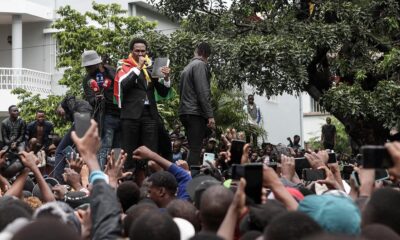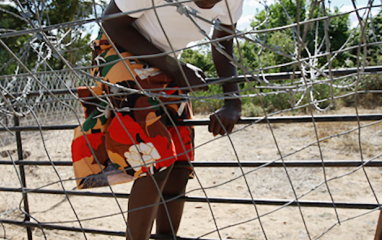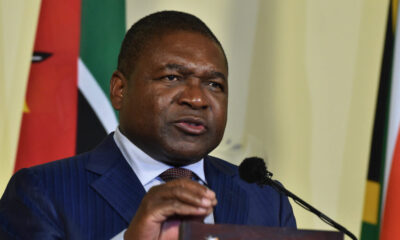NEW investigation by The Sentry, a United States investigative organisation, has uncovered significant concerns over the involvement of South African businessman Errol Gregor in a multibillion-dollar oil pipeline project between Mozambique and Zimbabwe.
Gregor, previously linked to an alleged US$45 million fraud scandal in Ghana, is now leading a plan to build a second oil pipeline connecting the Mozambican port of Beira to Harare.
“The involvement of a figure like Gregor in such a major government project should give pause,” said Nick Donovan, Senior Investigator at The Sentry.
“This case highlights the need for more transparency, rigorous oversight, and active international anti-corruption efforts when it comes to infrastructure development involving countries plagued by predatory business operators and entrenched kleptocracy. The fact that a UK bank and South African pension funds may have inadvertently supported a possible multimillion-dollar bribery scheme heightens the urgency. This should be a wake-up call for more aggressive due diligence and, where appropriate, hard-hitting accountability.”
Gregor’s history includes suspicious payments authorised during a 2016 bid to control a vital oil facility connected to the Tema Oil Refinery in Ghana.
According to The Sentry’s report, Gregor, through his former company Mining Oil and Gas Services (MOGS), funneled millions to various third parties via Edwin Obiri, a Ghanaian deal broker, raising red f lags for potential bribery and corruption.
The report further alleges that some funds may have reached high-ranking political figures, including within Ghana’s National Democratic Congress opposition party.
Moreover, the financing for this operation involved the UK’s Standard Chartered bank and South Africa’s Public Investment Corporation, potentially exposing them to financial risks tied to these questionable transactions.
Despite ongoing legal proceedings in South Africa related to his previous dealings, Gregor is moving forward with plans to establish a multibillion-dollar oil pipeline through his new company, Coven Energy.
The pipeline aims to position Zimbabwe as a regional fuel distribution hub, but its progress raises questions about transparency, due diligence, and the role of potentially corrupt actors in Zimbabwe’s infrastructure projects.
In response to questions sent before publication of this report, Obiri denied wrongdoing, and Gregor did not reply.
Selected report findings:
Suspicious payments in Ghana:
Gregor led a bid for control of an offshore oil platform in 2016, during which he authorised over US$18 million in questionable payments.
These payments, allegedly funneled through Obiri, sparked anti-bribery concerns from auditors and a lawsuit for fraud.
Some of the payments reached Kingsley Kwame Awuah Darko, the public official who awarded the bid to Gregor’s company MOGS.
Should add sentence or two about the other US$27 million as the headline refers to a US$45 million scandal
Involvement of British banks and South African pension funds:
The report reveals that f inancing for Gregor’s previous deals in Ghana involved loans from UK’s Standard Chartered bank and funds tied to South African pensioners through the Public Investment Corporation.
These institutions may have inadvertently been drawn into the fraudulent transactions uncovered by The Sentry’s investigation.
Concerns for Zimbabwe: Despite Gregor’s involvement in the Ghanaian fraud scandal, his company Coven Energy is now advancing plans for a new pipeline between Mozambique and Zimbabwe.
The Sentry’s investigation raises concerns about the lack of transparency and risk of corruption in this infrastructure project.
Recommendations:
The Sentry’s report provides critical recommendations for urgent action by governments and financial institutions, including:
The governments of Zimbabwe and Mozambique should commission an independent feasibility study on the proposed pipeline project.
Additionally, The Sentry urges enhanced transparency measures and public scrutiny over infrastructure projects, including open tendering process and public disclosure of contracts and beneficial ownership
The money for the Ghanian oil facility, GPMS, came from South African pensioners and taxpayers and the UK’s Standard Chartered bank.
Accordingly, law enforcement agencies in the three relevant jurisdictions — the UK, Ghana, and South Africa — should investigate the purchase of GPMS by MOGS, focusing on identifying the recipients of funds paid by Obiri, to find out whether those receiving monies were doing so on behalf of public officials, meaning that the payments had therefore potentially breached anti-bribery laws.
The government of Zimbabwe should consider a “fit and proper person” test for companies involved in key infrastructure projects, analogous to requirements in the banking sector.
As part of the application or renewal process for an investment license, the Zimbabwe Investment and Development Agency could assess the probity of any individual with civil judgments against them, previous criminal convictions, and/ or significant adverse media.
The government of Zimbabwe should upgrade existing procurement law by embracing open contracting standards.
The government of Zimbabwe should follow the example of other states by making contracts invalid unless published, creating an incentive for companies and procuring entities to desire publication.
The governments of Mozambique and Zimbabwe should commission an independent, impartial study examining whether a second pipeline makes economic sense.
The results should be published.
Financial institutions should conduct enhanced customer due diligence on transactions involving Errol Gregor, Kingsley Kwame Awuah Darko, and Edwin Obiri, as well as any legal entities linked to them.
— STAFF WRITER.





















